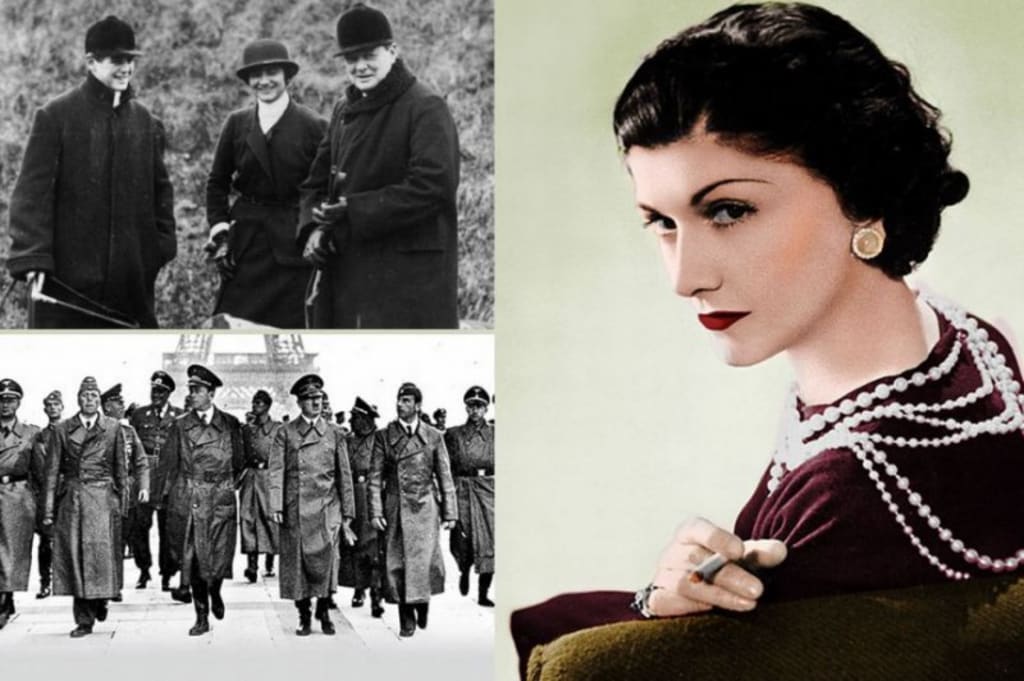Coco Chanel was a Nazi
Confronting the dark side of the famous designer and her brand.

When someone thinks of designer brands, there are many that come to mind, but few have the history, let alone notoriety, of the Chanel brand. The simple, yet sophisticated, logo is easy to identify, and is known across the globe. Unfortunately, both the brand and Coco Chanel herself, have ties to something much darker than a little black dress.
Born Gabrielle Chanel, the designer came from humble beginnings. She was born into poverty and sent away to a convent-orphanage when she was 12. But by the time WWI came around she had managed to debut her womens clothing line, and was thrust into a world of high profile artists and politicians alike, and just in time. By the time Hitler and his forces were begining to spread, Chanel was in the perfect position to take advantage of the new opportunities WWII would present for her.
It's not completely uncommon knowledge that by the time the Nazis took Paris in the 1940's, Coco Chanel had developed a relationship with Baron Hans Günther von Dincklage, an officer in Abwehr, the German military intelligence. It allowed her a certain ammount of social standing and comfort in the new Nazi controled Paris. There are the stories of her designing uniforms for the Nazi youth and rubbing shoulders with certain high profile officials, but after the declasification of many WWII documents, some new information came to light that she was more involved that anyone previously thought.

In 2011, investigative journalist Hal Vaughan released his book Sleeping with the Enemy: Coco Chanel's Secret War, uncovering some rather damning details as to just how involved Coco Chanel was with the Nazi party. According to Vaughan's research, she was not only involved with them socially, but took an active role as a Nazi agent. Around 1941, Chanel was registered as Agent F-7124, code name "Westminster," after her former lover, the Duke of Westminster. During this time, she was tasked with obtaining political information from collegues in Madrid. She traveled to Spain with Vaufreland, where she may have attempted to gather information from British diplomat Brian Wallace. It is unclear if she was successful, or even if she helped the Nazis get any information of importance, but Chanel's interactions in Madrid were enough to impress Abwehr supervisors, and earn the release of her nephew, André Palasse, from a German stalag.
Chanel may have had another motivation for working with the Nazis. Money. In 1924, the Jewish Wertheimer family had backed the launch of her perfume line in exchange for most of the profits. Chanel's perfume line continues to be one of their most profitble. She had been trying to renegotiate their agreement in her favor, to no avail. However, arayanization laws in Nazi Germany forced Jews to give up their businesses. This would give Chanel the opportunity to reclaim a large part of her business. However, this wouldn't work out for her, as Wertheimer was able to transfer his portion of the business to a non-Jewish Frenchman named Félix Amiot before fleeing to the USA. There is speculation that a lot of Chanel's anti-semetic views came from her frustration with the Wherheimer family's amount of power over her company. But, despite all of this, the family backed Chanel again after the Nazis lost the war, helping her re-establish herself in France after the war, and even paying her bills for the rest of her life. However, this move was likely less about forgiveness, and more about long term financial gain, as the Wertheimer family is now one of the wealthiest families in the world. To this day, they refuse to talk about the family past with Coco Chanel.
But what does this history have to do with the Chanel brand today, and how much does the past influence the present? This is honestly a debate that is far beyond me. The Chanel brand as a whole has recognized certain parts of Coco's involvment in WWII, but has dismissed Vaughan's book as mere speculation in the past. One could argue that the brand's aesthetic as a whole, austere and minimalistic, stems from a place of European far-right ideologies of the time. Does this mean anyone who buys from Chanel is a bad person? I'm inclined to say no. But the company has a responsibility to confront the history of the brand. How they do this, is a debate for another time.
I would also like to point out that Chanel is not the only brand with a history tied to the Nazi party. Brands like Balenciaga, Dior, Hugo Boss, and Louis Vuitton either found great profit in Nazi occupied France, or had ties to the Nazi party or their members. And while the debate rages on as to wether or not the companies today hold responsibility for the part they played back then, there is no denying that they owe a large portion of their current success to one of history's greatest tragedies.
About the Creator
Abby Ramsay
Actress, model, activist, femenist, asexuality and mental illness advocate, and dog mom. Abby grew up in Pennsylvania before moving to LA to get her BFA in acting.
Instagram @abbysworldsastage






Comments
There are no comments for this story
Be the first to respond and start the conversation.